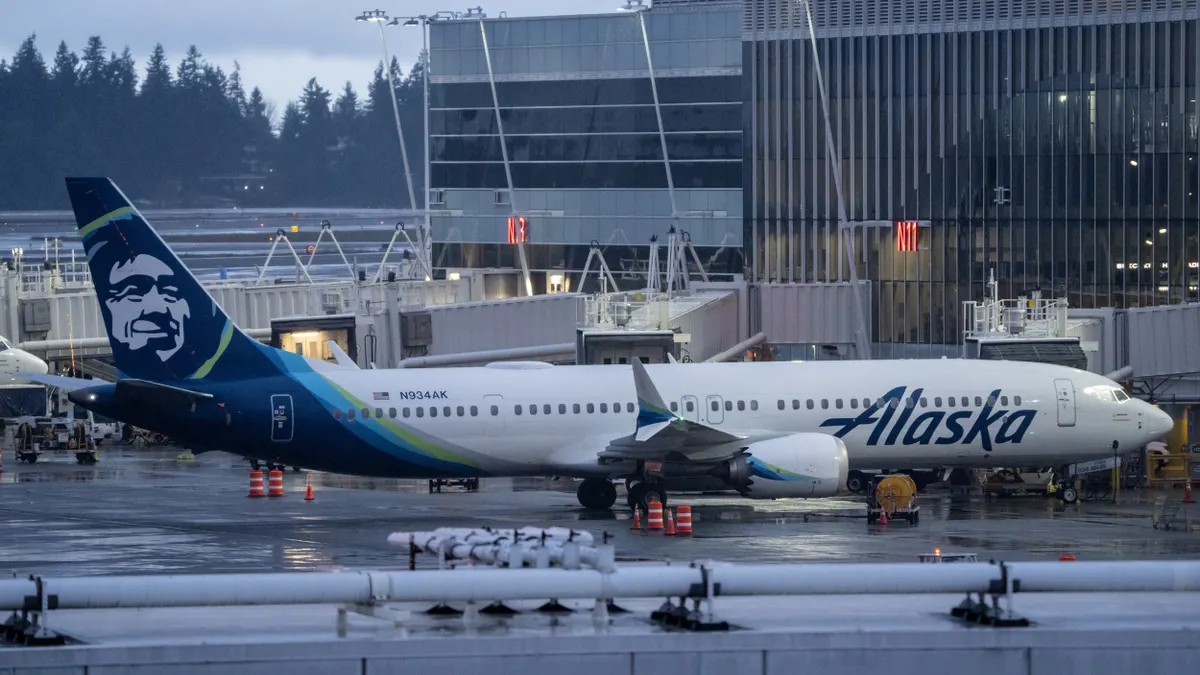Dive Brief:
- The Boeing Company narrowed its net loss and reported a 35% boost in revenue for its most recent quarter, coming as the aircraft manufacturer continues to face regulatory and economic headwinds. The company’s core loss per share of $1.24 was “a significant improvement compared to last year,” CFO Brian West said Tuesday during the company’s earnings call, citing higher commercial deliveries as well as improved operational performance as key drivers.
- The Arlington, Virginia-based company’s latest earnings come several weeks after Boeing announced it would be appointing Lockheed Martin veteran Jay Malave as its CFO, effective Aug. 15, CFO Dive previously reported. West is set to transition to the role of senior advisor also as of Aug. 15.
- “I also want to extend my deep appreciation of Brian West for his outstanding work over the last four years to stabilize our business and navigate the recovery, all while continuing to position the company for our future,” President and CEO Kelly Ortberg said Tuesday during the company’s second quarter earnings call. “I look forward to welcoming Jay to Boeing and Brian's continued counsel in his new role.”
Dive Insight:
As CFO, Malave is set to receive an annual base salary of $1.05 million, as well as a cash award of $1.5 million, according to a July 3 securities filing. He will also be eligible to receive an annual bonus with a target value of 120% of his base salary, and beginning in 2026 will be eligible to receive long-term incentive awards with a target value of $6.5 million, per the filing with the Securities and Exchange Commission.
In “light of his recent employment” with Lockheed Martin, Malave has also agreed to certain conditions related to his appointment as Boeing’s finance chief, including not participating in the Boeing Defense, Space & Security business until the end of the year, according to the filing. Boeing has also agreed to pay Lockheed $2 million “in connection with a release of claims relating to Mr. Malave’s employment with the Company.”
Malave, who served as Lockheed Martin’s finance chief for three years before departing this past April, is poised to take the financial reins at the jet maker as Boeing seeks to execute on a turnaround plan aimed at regaining profitability and repairing both consumer and regulatory trust in its business.
The company narrowed its net loss for the quarter ended June 30 to $612 million compared to $1.43 billion for the prior year period. Revenue, meanwhile, spiked 35% to hit $22.7 billion for the quarter. The jet maker also narrowed its cash burn to $200 million for its Q2, compared to $4.3 billion for the prior year period — an improvement CFO West also attributed to higher commercial deliveries and working capital.
The jet maker is still facing a number of challenges, however, including continued scrutiny from regulators following several plane crashes and incidents in recent years.
The company remains under a production cap for its 737 aircraft, imposed by the Federal Aviation Administration following a January 2024 incident where a door plug flew off an Alaska Airlines flight. In June, the FAA found that Boeing failed to provide adequate training and oversight for its manufacturing operations, which led to the incident.
Boeing remains on track to request approval from the FAA to expand production of its 737 aircrafts to 42 per month from the current 38 per month cap, CEO Ortberg said Tuesday.
“On 737, you'll recall our plan was to methodically ramp up to 38 per month, stabilize at that rate and then request an approval from the FAA for the next rate increase to 42 aircraft a month,” he said in response to questions. For its Q2, Boeing delivered 150 commercial jets, and achieved its rate of 38 737 planes per month, and is “now focused on demonstrating stability at that rate.
We'll continue to use key performance indicators that have been agreed to with the FAA to measure the health of the production system,” Ortberg said, noting Boeing “expects to be in a position” to request approval to increase the cap to 42 planes in the company months.
Ortberg also downplayed the risk of a possible strike of approximately 3,200 employees in the company’s fighter and munitions facilities in St. Louis and St. Charles, noting the “the order of magnitude of this is much, much less than what we saw last fall,” when about 30,000 machinists went on strike.
“We'll manage through this,” Ortberg said of the impending strike. “I wouldn't worry too much about the implications of the strike. We'll manage our way through that.”
















